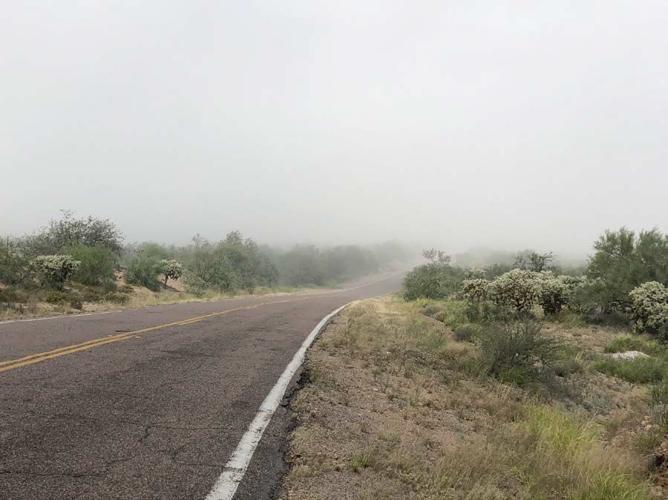The mining giant Freeport McMoRan will pay $230,000 to settle repeated alleged violations of Pima County air quality rules due to tailings dust blanketing Green Valley from the Sierrita Mine, county officials say.
The announcement of a settlement comes seven months after the Pima County Department of Environmental Quality slapped the last of several violation notices on the mining company for blowing tailings dust. The notices covered dust incidents on nine days spanning more than a two-month period ending Nov. 29, 2018.
The alleged violations — which Freeport neither acknowledged nor contested — included instances of tailings dust crossing the company’s property boundary and of dust so thick as to exceed county limits, the county DEQ says.
At the time, residents told the county and the Arizona Daily Star about “large sheets of dust” leaving mine property, about tailings “inundating” a home, of tailings leaving a thick coating on outside furniture, patios, bushes and trees and of “dust everywhere, including my eyes.”
The settlement requires Freeport to pay $30,000 in civil penalties.
The other $200,000 will go to build a 1.45-mile paved walking path alongside the now-closed Canoa Hills Golf Course in Green Valley that’s being converted into a county park.
The $200,000 — less than Freeport has voluntarily spent in neighborhood cleanup work from the incidents — represents restitution for the emissions violations, the county DEQ said. The two parties signed the settlement agreement Monday.
Freeport has committed to taking numerous steps to try to prevent tailings dust from blowing so far and thick in the future. Recent inspections at the open-pit copper mine have found the measures are working, county officials said this week.
Last fall, the company said extraordinarily high winds and heavy rains — which can make it impossible to apply tailings dust suppression materials — contributed heavily to the blowing dust.
Inhaled airborne dust, called particulate matter, can cause serious health problems, especially in people with heart and lung disease, and in particular can aggravate asthma. The small particles, which are regulated by the U.S. Environmental Protection Agency, can lodge deeply in the lungs and, if small enough, may pass into the bloodstream, the county says.
The tailings dust incidents sparked at least dozens of calls to the county from people complaining about white dust covering their properties.
On Wednesday, Freeport’s Vice President of Communications Linda Hayes said the company had spent more than $300,000 in neighborhood cleanup costs for about 800 residents in the Green Valley area.
“This was the right thing to do in support of the community where we live and work,” Hayes said in an email to the Star.
The company is committed to responsible dust management, and continues to evaluate opportunities to improve its dust-management system, Hayes said.
County DEQ Director Ursula Nelson said last fall that the latest Freeport violations were the most serious of five rounds involving blowing dust since 2013. The county got the most complaints it’s received about any tailings dust since Asarco’s neighboring Mission Mine had three rounds of violations in 2009 and 2010, said Beth Gorman, a DEQ program manager.
Those violations triggered $450,000 in penalties for Asarco — $100,000 in fines and $350,000 in contributions toward county environmental projects.
“Tailings piles, if they are properly covered and controlled, there would not be blowing dust,” Nelson said Wednesday. “There clearly was something that happened where the tailings were not properly covered and controlled.”
Under some interpretations of the county’s air quality rules, a violation occurs every day the tailings dust isn’t controlled, and the county issued notices to Freeport covering a lengthy period: from Sept. 18 to Nov. 29, 2018, Nelson said.
At a $10,000 a day maximum penalty under county laws, Freeport could have faced a maximum fine of more than $600,000.
But Nelson noted that Freeport had already paid the $300,000-plus in neighborhood cleanups. Freeport, unlike Asarco, had already been taking steps to try to control the tailings dust before these incidents occurred, Nelson added.
“It ended up more of a negotiated process than a calculated number,” Nelson said. “It’s not like you exceed the speed limit and your ticket is set and that’s your story. More analysis goes into something like that.”
Also, “if we had gone to court to have a judge decide, who knows what would have come out of that?” Nelson said.
This week, two Green Valley residents said they are satisfied with the settlement.
Because the company had already paid the $300,000, “I think that settlement for the park is adequate,” said Don Franklin, a retired Marine who said his home, patio, shrubs and classic car were covered last fall with material resembling “a light dusting of snow.”
“I know people in my neighborhood, winter people, they weren’t even here at the time the tailings dust blew, they got their cars detailed (at Freeport expense) and brought in trucks and also got them detailed.
“You could put in a claim and immediately they approved it. They pressure-washed patios and pressure-washed driveways,” he said.
Laurel Capricio, a real estate broker who lives in Green Valley, said she’s happy the county directed the restitution money to the local park.
“If this is genuinely $200,000 to start the whole project, if this will give the park a foothold, it’s a good thing,” Capricio said.
The tailings dust is more than just a cleanup issue, she added.
“It’s really a health issue. I sell real estate in town. People ask me about mines all the time,” she said. “I’d like to be able to say to them that I live in Green Valley and it is a beautiful town and you have no concerns from the mines. And I can’t say that any longer because of this.”





